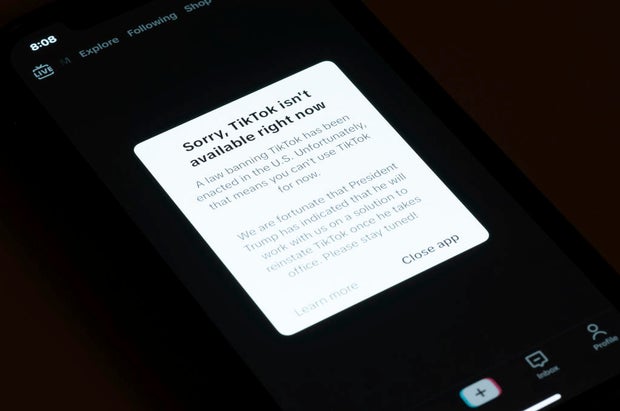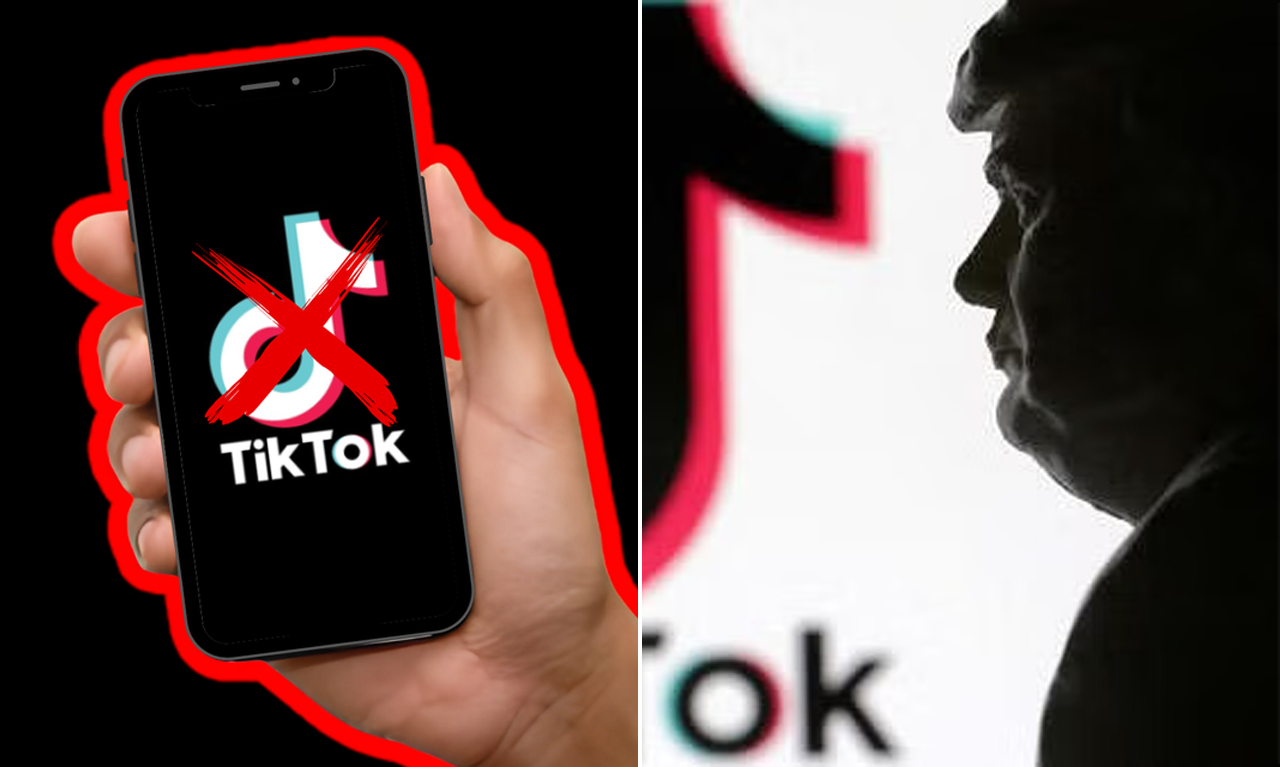Washington — TikTok began restoring service to users in the United States following a temporary and voluntary shutdown that lasted less than a day. The company said Sunday that it was in the process of reinstating access after President-elect Donald Trump vowed to try to pause the ban by executive order on his first day in office.
“We thank President Trump for providing the necessary clarity and assurance to our service providers that they will face no penalties providing TikTok to over 170 million Americans and allowing over 7 million small businesses to thrive,” TikTok said in a statement. “It’s a strong stand for the First Amendment and against arbitrary censorship. We will work with President Trump on a long-term solution that keeps TikTok in the United States.”
STATEMENT FROM TIKTOK:
In agreement with our service providers, TikTok is in the process of restoring service. We thank President Trump for providing the necessary clarity and assurance to our service providers that they will face no penalties providing TikTok to over 170…
— TikTok Policy (@TikTokPolicy) January 19, 2025
TikTok app owner ByteDance voluntarily shut down service in the U.S. just hours before a Sunday deadline, cutting off access to tens of millions of users after the Supreme Court this week upheld a law that effectively banned it over concerns about its ties to China.
The law passed by Congress last year gave TikTok’s Chinese parent company ByteDance until Jan. 19 to divest from TikTok or be cut off from U.S. app stores and hosting services. TikTok said a sale wasn’t possible and challenged the law in court, but it was rejected by a unanimous Supreme Court on Friday.
Trump on Sunday posted on social media that he would restore TikTok, first writing “SAVE TIKTOK” and then vowing to issue an executive order on Monday to extend the period of time before the law takes effect. Further, he said there would be no liability for companies that helped keep TikTok from going dark before the order went into effect.
“Americans deserve to see our exciting Inauguration on Monday, as well as other events and conversations,” he wrote. “I would like the United States to have a 50% ownership position in a joint venture. By doing this, we save TikTok, keep it in good hands and allow it to say up. Without U.S. approval, there is no Tik Tok. With our approval, it is worth hundreds of billions of dollars – maybe trillions.”
The court’s decision said the divest-or-ban law does not violate the free speech rights of TikTok or its 170 million users in the U.S., agreeing with the government’s position that the platform could be used by China to collect a vast amount of sensitive information on Americans.

While the Biden administration said enforcement of the law would be left to the incoming Trump administration, the company itself took itself offline shortly before Sunday’s midnight deadline.
Users in the U.S. who opened the app late Saturday night were greeted with a message with the headline, “Sorry, TikTok isn’t available right now.”
“A law banning TikTok has been enacted in the U.S.,” the message reads. “Unfortunately, that means you can’t use TikTok for now. We are fortunate that President Trump has indicated that he will work with us on a solution to reinstate TikTok once he takes office. Please stay tuned!”
The app was also no longer available in the Apple or Google Play stores. CBS News has reached out to TikTok for comment.
Trump’s incoming national security adviser, Mike Waltz, told “Face the Nation with Margaret Brennan” on Sunday that the president-elect had spoken to Chinese President Xi Jinping and “they agreed to work together on this.”
“We can have an app that protects Americans,” Waltz said. “And I could tell you, I wouldn’t want the FBI or the U.S. government monitoring every keystroke or seeing every password, nor would we want the Chinese Communist Party. But we also want an app that 170 million Americans clearly really enjoy and that we were able to get our message out during the Trump campaign in a very powerful way.”
TikTok had said Friday it would “be forced to go dark” beginning Sunday unless the Biden administration assured service providers that the law would not be enforced. The White House called the appeal “a stunt” and said the company should bring up its concerns with the Trump administration.
“We see no reason for TikTok or other companies to take actions in the next few days before the Trump Administration takes office on Monday,” White House press secretary Karine Jean-Pierre said.
Internationally on Sunday, the TikTok app remained accessible, and there was no indication for international users that it had gone dark in the U.S. It was still possible to view and interact with American accounts, and there was no obvious official signposting that U.S. users’ access had been restricted.
Even if President-elect Trump declines to enforce the ban, the law would still be on the books, and companies like Apple and Google could be penalized down the road for violations. Trump previously vowed to “save” TikTok, and said Saturday that he was considering an option to extend the deadline for the law to go into effect.
“The 90-day extension is something that will be most likely done, because it’s appropriate,” he said in the phone interview, adding, “if I decide to do that, I’ll probably announce it on Monday.”
The law includes a provision that allows for a short-term extension if there is a sale in progress.
During Supreme Court arguments on Jan. 10, Noel Francisco, a lawyer for TikTok, warned that the platform would shut down when the law went into effect, explaining that it would be “extraordinarily difficult” for a divestiture to occur under any timeline because the Chinese government opposes a sale of the algorithm that powers the platform by tailoring video recommendations to each user.
“As I understand it, we go dark,” Francisco said.
But even if there is an eventual sale that did not include TikTok’s algorithm, it would take “many years” for a new team of engineers to rebuild it and it would be a “fundamentally different platform,” according to Francisco. He said the company’s inability to share any user data with ByteDance under the law would cut off American users from viewing content from other parts of the world and vice versa.
The bipartisan law was tucked into a foreign assistance package that swiftly passed Congress and was signed by President Biden last April. TikTok and ByteDance challenged the law the next month, calling it “an extraordinary and unconstitutional assertion of power” based on “speculative and analytically flawed concerns about data security and content manipulation” that would suppress the speech of millions of Americans.
In a December ruling, a federal appeals court upheld the statute, saying the U.S. government “acted solely to protect that freedom from a foreign adversary nation and to limit that adversary’s ability to gather data on people in the United States.” The appeals court later denied TikTok’s bid to delay the law from taking effect, pending a Supreme Court review.
The Supreme Court moved with extraordinary speed to take up the case after TikTok requested the justices order a temporary pause. The court issued its opinion a week after hearing arguments and two days before the law took effect.
“There is no doubt that, for more than 170 million Americans, TikTok offers a distinctive and expansive outlet for expression, means of engagement, and source of community. But Congress has determined that divestiture is necessary to address its well-supported national security concerns regarding TikTok’s data collection practices and relationship with a foreign adversary,” the court’s opinion said.
The justices cited Congress’ finding that companies can be required to turn over data to the Chinese government under Chinese law.
“The government had good reason to single out TikTok,” the court said.
Solicitor General Elizabeth Prelogar noted during arguments that there’s “nothing permanent or irrevocable that happens” on Sunday. The law provides the authority for the restrictions to be lifted on TikTok if there is a sale after the date.
“Congress expected we might see something like a game of chicken. ByteDance saying, we can’t do it, China will never let us do it. But when push comes to shove and these restrictions take effect, I think it will fundamentally change the landscape with respect to what ByteDance is willing to consider,” Prelogar said.
In a video statement after the Supreme Court issued its decision, TikTok CEO Shou Zi Chew appeared confident that the app would have a future under Trump. He thanked the incoming president for his commitment to finding a solution that would allow TikTok to continue operating in the U.S. “for years to come.”
Trump, who tried to ban TikTok during his first term over national security concerns, said Friday that he spoke with Chinese President Xi Jinping about TikTok. A Chinese summary of the call did not mention that it was a topic of discussion.
Barring a sale or Congress overturning the law, there’s no long-term certainty about TikTok’s future in the U.S. If Trump or a future president declines to enforce the law, companies like Apple and Google could still face steep fines in the future.
“On the 19th, if it doesn’t shut down, there is a violation of law, correct?” Justice Sonia Sotomayor asked Prelogar, who said, “Yes.”
“And whatever the new president does, doesn’t change that reality for these companies,” Sotomayor continued, referring to the penalties facing app stores and web hosting services.
“That’s right,” Prelogar said, adding that a five-year statute of limitations exists.
Haley Ott and Emily Mae Czachor contributed to this report.
Caitlin YilekCaitlin Yilek is a politics reporter at CBSNews.com, based in Washington, D.C. She previously worked for the Washington Examiner and The Hill, and was a member of the 2022 Paul Miller Washington Reporting Fellowship with the National Press Foundation.






